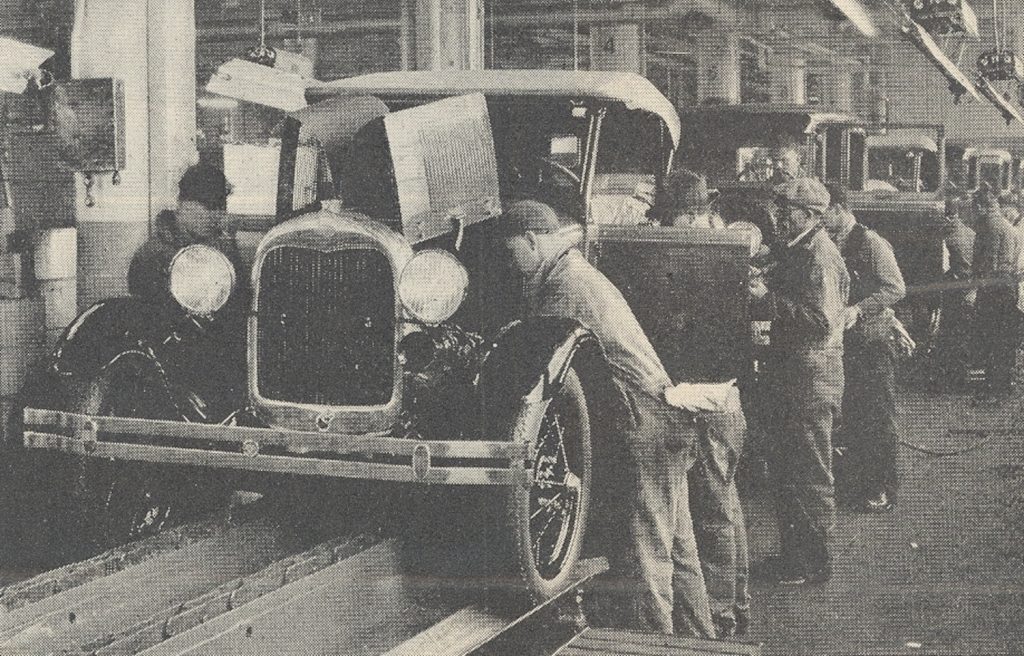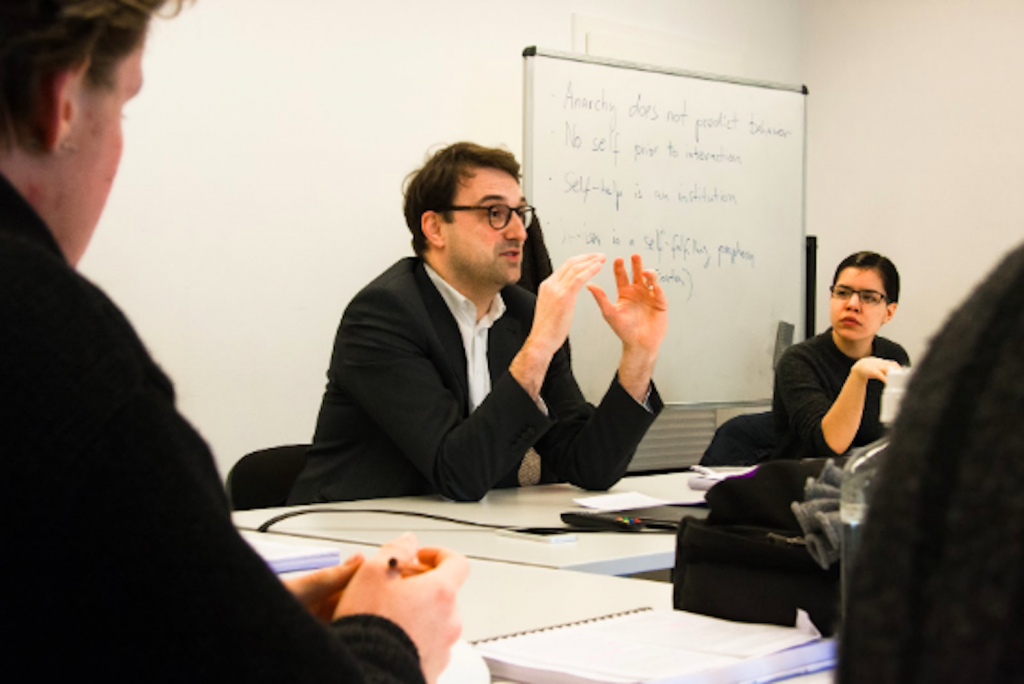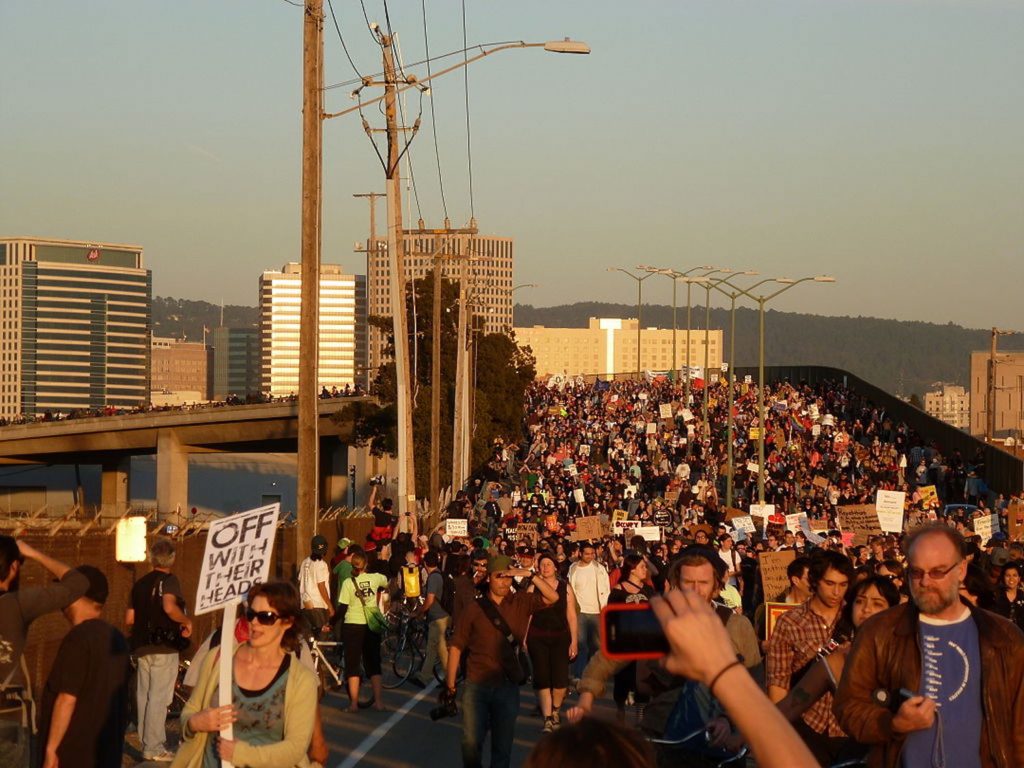“Care is a political phenomenon, and the crisis of care is beyond just the denudation of these public structures: it is actually a deep-rooted attack on working class life-making.”
-Tithi Bhattacharya, March 2019 interview with Jacobin Magazine’s “The Dig”
After the publication of last month’s Feminism for the 99%-inspired examination of the German public sector strikes, I sat down with Bard College Berlin Politics Professor Boris Vormann to see how labor issues are being discussed on campus. We talked about the “unbundling of the Fordist Compromise”, the German general strike, international solidarity, and Professor Vormann’s Future of Work class. At one point I make this sound to indicate a topic transition, which has been edited out of the interview for clarity. Professor Vormann began our chat by providing some historical context on the state of the “institutional infrastructures” like education, healthcare, and transportation in the age of globalization.
Alexandra: In the first part of this series, I talked about the benefits of an expansive definition of care work that’s put forward by Cinzia Arruzza, Tithi Bhattacharya, and Nancy Fraser in their manifesto Feminism for the 99%. Care workers, which under this definition include teachers, day-care workers, nurses, librarians and firefighters, represent most of the laborers who participated in Germany’s 2019 public sector strike. These workers are also responsible for dealing with some of the fallout of an extremely unequal world — I think of firefighters in California (many of whom are incarcerated) struggling to contain forest fires fueled by climate change or teachers in Berlin who struggle to provide their students with access to adequate mental health care. Can you talk about where you see care work in the context of work in the 21st century more generally?
Boris Vormann: Until very recently, there’s been a widespread assumption in societies of the Global North that globalization necessarily renders flows of goods, people and capital more and more mobile.
Part of that vision was that there was nothing much that we can really do about this increase in exchange and mobility — and that it is overall desirable. As such, we tend to think that we can relocate, outsource and offshore every type of job. But care work is one example of how this is not necessarily the case: some tasks simply need to be carried out in close proximity to the point of consumption. In short, the globalization of work does not seem to be that inexorable after all.
Moreover, an increasing number of scholars have begun to emphasize in recent years that the expansion of markets and the division of labor is not a natural process that simply reshuffles social relations. Rather, we rely on a certain set of institutional arrangements and infrastructures (transportation and communication) to make specialization and large-scale trade possible. In other words: those flows don’t simply happen, they are facilitated — and the state has been the single most important actor in doing just that. If that is so, however, and if many are affected in negative ways by the restructuring of labor markets, is the state acting in the interest of the population?
In earlier historical contexts, state work was indeed conceptualized differently. Post-World War II economies in the North Atlantic were organized around the principle that states would provide certain types of goods in order for societies to work well, infrastructure just being one of them. Education, public spaces, libraries, a functioning health care system are some other examples. At that point and time, there was a different vision of what work was supposed to be and also what society was supposed to provide for a living beyond the bare necessities.
That vision has changed. With the ideological and practical shift toward marketization since the mid-1970s, paradoxically, some of the public goods that made the global expansion of markets possible in the first place, are suddenly underfunded and falling apart today. 21st century globalization has been built on post-World War II pillars — and these pillars are currently eroding in the Global North. Defunct US transportation infrastructure is perhaps the best case in point.

Alexandra: What do you see as happening during the decades of the immediate post-World War II period?
Boris: What we see in the European and the North American context, mostly, after World War II, is a certain consensus between labor, the state, and capital. Scholars have come to call this the Fordist Compromise, which was centered around a certain ideal of labor benefiting from economic growth. The productivity gains made in the manufacturing industries were to be redistributed to workers so that they would be able to buy products. This is what has been also called the nexus between mass consumption and mass production. This arrangement, basically organized by the state, created consumer societies, and enabled a coupling of productivity and wage increases.
What’s important is that these systems operated at the national scale. This worked for a while, when the national economy was congruent with national politics — when the division of labor was basically a national division of labor in the manufacturing industries. Obviously, resource extraction happened in colonial elsewheres at this time already, but, generally speaking, there was a possibility for a political and economic consensus in the metropolis.
However, this compromise came undone with the rise of a new set of market-oriented ideologies in the 1980s — and, just as importantly, with global infrastructures (computerization and containerization) that facilitated global production networks and undermined that national nexus. I think that many of the political and economic crises today are echoes of this unbundling of the Fordist Compromise, i.e. of the undermining of the public quality of these different goods, and the aggravation of certain disparities within and between societies that ensued.

Alexandra: A couple of my friends are taking your Future of Work class. I am interested to know about what topics you have covered in it.
Boris: We started out by looking at utopian ideas of the future of work as they have been formulated in the last years. We read Paul Mason, Jeremy Rifkin, David Graeber, and Edward Glaeser, and a couple of other authors. Some of these writers take more social democratic, some more conservative positions, while all have put a heavy emphasis on the importance of technological innovation. What we were aiming to do in the rest of the term was to understand how technology depends on certain social relationships and political institutions and how it reshapes them. We’re trying to get away from the notion of technology as the one determinant of social development, but rather attempting to figure out how it emerges in specific contexts and prioritizes certain social functions over others.
To gain some historical knowledge after these initial readings, we then jumped back into the past and looked at the 19th century in some detail. We spent a couple of weeks exploring the construction of railroads in the North American context and how they necessitated new forms of firm organizations. The corporation emerged at this moment in time to facilitate long distance trade. Even the modern nation-state (which some associate with the bourgeois revolutions of the 18th century) was really built around the railroad infrastructure, which required new types of large-scale administrative capacity. With the emergence of a national economy and a modern national state, new forms of labor organization on a mass scale also began to form.
This is the background against which we examined the emergence of mass production and the New Deal Order. We worked our way through the Fordist period to the present and to the future, trying, again, to develop a sense of how technological development co-depends on and shapes social, economic and political relationships. I think what we have been doing in the process is developing a more critical notion and a more complex understanding of how work changes and how the division of labor transforms over time, and what exactly that means socially — particularly with regards to the question: who benefits and who loses?
Alexandra: Shifting gears, we spoke at the beginning of the interview about the specialization that is mutually dependent upon public service labor in Germany and elsewhere in the world. Do you see natural solidarities or alliances between students and public service workers in Germany? I don’t think these connections are always intuitive, especially for those of us who attend private universities or rely on private insurance systems.
Boris: There is no such thing as a such thing as a “natural alliance”. Markets depend on care work that is often racialized and gendered, i.e. work that is necessary to sustain the division of labor, but that often operates outside direct market transactions, and is not remunerated or recognized in the same way. Mariana Mazzucato, David Graeber and some others have helped initiate an important debate on the value of work: why is social and reproductive work so undervalued even though it is essential for our societies? And why is it that what David Graeber calls ‘bullshit jobs’ are at the same time socially unnecessary and sometimes even disproportionately well-paid? These authors also point out that full automatization of work is a much less likely scenario than the destruction of stable and relatively well-paid jobs through new, precarious work that is not protected by the same standards. Again, care work might be a harbinger of what is increasingly happening in other sectors: flexibilized work as (misclassified) independent contractors in short-term ‘gigs.’
It is also important to highlight another set of often overlooked co-dependencies. We depend on state work in ways that we tend to forget. The public sector coordinates, fixes, initiates, and facilitates tasks that private short-termism is ill-equipped to accomplish. We rely on these institutions to provide infrastructures often without even knowing it, when we travel or ship things from one place to another or when we use the streets. In that sense, yes there are connections, but it takes a bit to see them. People are so specialized and oftentimes so divided in their work that it takes some stepping back and some analysis in order to realize that there are connections that the division of labor does not only divide but also create co-dependencies.
A certain consciousness of these interrelations seems to emerge in different societies since the global financial crisis of 2008. Many social movements in the last couple of years have seen the critical potential of infrastructures, and of bottlenecks of infrastructures in particular. Occupy Wall Street in Oakland was trying to block the ports. In the G20 protests in Hamburg, there were also some attempts to interrupt trade flows. Moreover, discussions surrounding the ‘Green New Deal’ and ‘Fridays for Future’ are taking center stage. These examples display a growing understanding on the part of the movements regarding the global interconnectedness of work and of labor. Many of the unions in the past, in the late 19th and early 20th century, also developed at bottlenecks of (coal and oil) trade because they were able to develop collective bargaining powers by interrupting the otherwise seamless flow of commodities in such places.

Alexandra: I think that the increased ability to specialize under the division of labor demands an intentional divestment and reinvestment of resources that we as students have into the public resources that we use. We can use the critical skills we learn at university to build solidarity between students and public sector workers. Maybe not “natural”, as you pointed out, but critical solidarity with care workers.
Boris: I think that students have become more and more political over the last years. With Brexit and Trumpism, there’s a new realization that politics are important. Students are asking how political systems work and how inequalities are produced and maintained between and within societies. I think that a new debate about the future of societies and with it, a very strong critique of the status quo, are taking shape.
For a long time, commentators have been criticizing the political apathy of the youth. I think this passiveness (not just among the youth) truly existed and was related to an understanding of globalization as a thing that just happens and cannot be hindered, something that is external to our societies and (as I mentioned above) seemingly inexorable. Citizens are awakening to the fact that it does make a difference who is in office, and it does make a difference according to which principles and in what kind of society we live. I think it is because of this that there’s a much more urgent desire to understand how society and how politics operate, and how work, as an important aspect of our lives, can be rethought.
Alexandra: I think one the important function of mass protests is to facilitate the sharing information about how political societies function and to make space to imagine collective futures. Thank you for your time, Boris!
Interested in finding out more about these topics? Keep an eye out for a class about the divisions of labor offered by Professor Vormann in Spring 2020. If you’re interested in some summer reading, check out the Democratic Socialists Labor Commission’s reading list about American Labor and Union History! If your brain, like mine, is already being scrambled by finals, feel free to just watch this video of thousands of teachers taking to the streets in North Carolina on May 1 to demand state legislators increase teacher salaries and education spending.


nice article, this writing tells deeply about history of work. What is the ultimate purpose for human’s work? just for get money only or … (something beyond that)